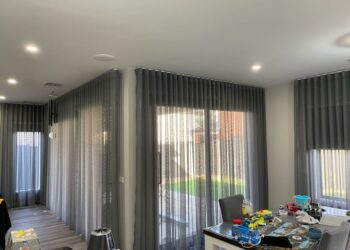If you have installed an inground pool in your house and are deciding to close it with a pool cover to keep it safe, congratulations! Not only have you decided what’s best for your family, wildlife, pets, and pool, but you have also chosen the best way to protect the pool during the off-season. These standard tarp-style safety covers protect against drowning, submersion, and accidents. If there is no cover on your pool, someone can step on it and face any mishap. The covers are necessary to avoid such incidents, so even if someone ventures on them, they will easily resist the weight, and nothing will submerge in the water or trap in the cover. Sometimes people leave their children at home, and if the swimming pool is covered, they will at least get peace of mind. Pool Cleaning Georgia tells us about two kinds of safety covers. One is a mesh cover, and the other is a solid safety cover, each having its benefits. Let’s learn about these covers and decide which cover you’d like to get from your pool closing services.
What is a Safety Cover?
Before going onto the benefits and disadvantages of safety covers, let’s learn what those are. Safety covers are used in winter to close the swimming pools. When you pull them securely and taut to your pool deck with the help of anchors positioned around the pool perimeters, they fit perfectly into your pool. A standard safety cover prevents debris, dirt, insects, and leaves from getting inside the pool water. They also prevent drowning and accidents, as mentioned above. Your safety covers need 36” solid deck space to drop the anchors into. Safety covers are great if you have inground pools, but not for above-ground pools.
Mesh vs. Solid Safety Covers. What To Choose?
Swimming pool covers are made up of two materials: solid vinyl and woven mesh. Once you have decided that you are getting the swimming pool closing done, your next step would be to choose the material for the cover. Each cover has its benefits and works differently, but despite your choice, they’ll provide the best protection anyone could ask for. Read below and learn about several advantages and disadvantages of both the covers that will help you make the decision.
Mesh Safety Covers
Mesh safety covers prevent debris, dirt, and insects from entering your pool. It permits melted snow and rain to flow through the gaps. You won’t have to worry about repeatedly cleaning the pool once you cover it. Re-opening will also become easy for you next spring. The Mesh safety cover is also made up of lightweight weave material and is very durable and good in quality. These covers are also available in several covers, and you can choose the desired color you want according to your architect and decor, which will make your swimming pool closing look good.
Advantages
- You can easily install, store and remove this cover as it is made up of 4lbs per 100 sq. ft.
- Standing water will not stand on the cover because it has small openings which let the water pass through them.
- You won’t need a cover pump if you get a mesh safety cover.
Disadvantages
- If you get a mesh cover for your pool, it will need cleaning when you re-open it.
- There are little holes in the mesh cover, which prevents sunlight from entering the pool and increases the risk of algae production.
- Sunlight and UV rays absorb water, chlorine, and other chemicals in the pool.
Solid Safety Covers
Solid safety covers are made up of solid vinyl PVC. These covers prevent debris, dirt, particles, and rainwater from entering the pool during winter. You can use cover panels or a cover pump to drain the accumulated water from the cover. These covers also provide some extra safety against heavy animals and tree branches. Seasonal pool closing service experts also offer equipment and cover pumps that help keep the water off the surface of the cover.
Advantages
- When you install a solid cover on your pool, it will remain clean the whole season, and you won’t have to clean it is re-opened.
- These covers are good at blocking UV rays and preventing algae production.
- If the safety cover is 100% solid, it will prevent Algae growth and water balance fluctuation and block phosphates, pollen, and acid rain from entering the water.
Disadvantages
- If your cover is 100% solid, you will need an automatic pool cover pump to drain the accumulated water.
- The pool closing service company will charge you for that pump because these covers are more costly than mesh covers.
- Even when not using the cover pump, ensure it works properly.
- Solid PVC covers are heavier than mesh covers, so you might have to put extra effort into them.
Bottom Line
There are plenty of safety cover options in the market, but the choice is yours. You have to keep in mind all the advantages and disadvantages of these covers so that you can purchase the most suitable cover for your pool. If you have no idea about the covers, you can take help from pool closing services experts, and they will be honest about the benefits, prices, and qualities of a cover.
Also read know about geekshub






